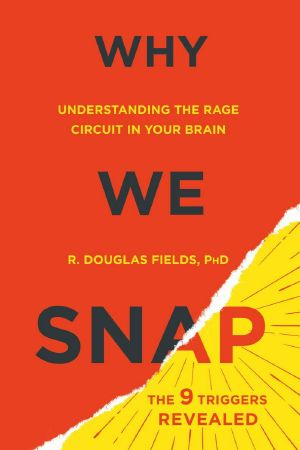Why We Snap · Understanding the Rage Circuit in Your Brain

- Authors
- Fields, R. Douglas
- Publisher
- Dutton
- Tags
- child psychology , cognition , cognitive psychology , developmental psychology , emotions , non-fiction , psychology , science , violence
- Date
- 2015-04-14T23:00:00+00:00
- Size
- 1.02 MB
- Lang
- en
The startling new science behind sudden acts of violence and the nine triggers this groundbreaking researcher has uncovered
We all have a rage circuit we can’t fully control once it is engaged as R. Douglas Fields, PhD, reveals in this essential book for our time. The daily headlines are filled with examples of otherwise rational people with no history of violence or mental illness suddenly snapping in a domestic dispute, an altercation with police, or road rage attack. We all wish to believe that we are in control of our actions, but the fact is, in certain circumstances we are not. The sad truth is that the right trigger in the right circumstance can unleash a fit of rage in almost anyone.
But there is a twist: Essentially the same pathway in the brain that can result in a violent outburst can also enable us to act heroically and altruistically before our conscious brain knows what we are doing. Think of the stranger who dives into a frigid winter lake to save a drowning child.
Dr. Fields is an internationally recognized neurobiologist and authority on the brain and the cellular mechanisms of memory. He has spent years trying to understand the biological basis of rage and anomalous violence, and he has concluded that our culture’s understanding of the problem is based on an erroneous assumption: that rage attacks are the product of morally or mentally defective individuals, rather than a capacity that we all possess.
Fields shows that violent behavior is the result of the clash between our evolutionary hardwiring and triggers in our contemporary world. Our personal space is more crowded than ever, we get less sleep, and we just aren't as fit as our ancestors. We need to understand how the hardwiring works and how to recognize the nine triggers. With a totally new perspective, engaging narrative, and practical advice, Why We Snap uncovers the biological roots of the rage response and how we can protect ourselves—and others.
"Neuroscientist Fields provides insight into the seemingly
inexplicable... highly readable... a thoughtful and essential light on
one of the darkest aspects of human behaviour." -Publishers Weekly"Neurobiologist
Fields offers a sensible, plainspoken guide to the all-too-common
phenomenon of rage... [a] thoughtful and anecdotal examination... Fields
timely exploration of sudden acts of violence is sure to inspire
conversation." - Booklist"The interplay between conscious
and unconscious cognition is not unfamiliar territory, as readers of
Daniel Kahneman or Malcolm Gladwell will recognize, but Fields' personal
experience adds a fresh viewpoint to an intriguing subject." - Kirkus Reviews"A
fusion of news, in-person interviews, and academic research, this book
will appeal to readers of popular neuroscience and those seeking
specific information on anger and rage." Library Journal"This
book is a riveting journey into your brain s most mysterious,
dangerous, and possibly redemptive territory. Douglas Fields guides us
into the core of rage, and offers us a blueprint for understanding and
perhaps remedying the explosions of violence that can mar our world and
our lives." Dan Coyle, author of The Talent Code"Doug
Fields explores the dark matter of the soul engrained in a the web of
neurons in our brain. This is a superbly told investigation into the
question of why we snap with urgent, useful implications for our
personal lives as well as for the wider world. Everyone should know
about the triggers of the rage circuit Doug Fields has defined." Daniela Schiller, PhD, Neuroscientist, Icahn School of Medicine at Mt. Sinai"A
superb must-read for anyone hoping to understand the common neural
roots of spontaneous acts of violence, rage, and, yes, heroism. The
argument is both riveting and convincing; the implications are profound,
from rethinking the relationship between violence and personal
responsibility to possible ways to temper the 'snap' response." --Robert Burton, M.D. author of On Being Certain
R. Douglas Fields is senior investigator at the National
Institute of Health in Bethesda, Maryland. He became head of the
Neurocytology and Physiology Unit in 1994 and chief of the Nervous
System Development and Plasticity Section in 2001. He is editor-in-chief
of Neuron Glia Biology and a member of the editorial board of several other journals in the field of neuroscience.